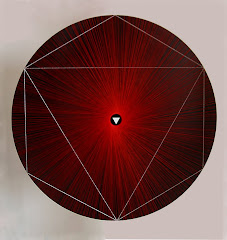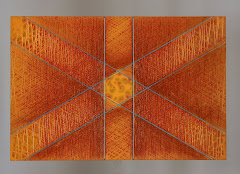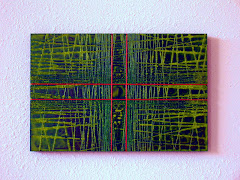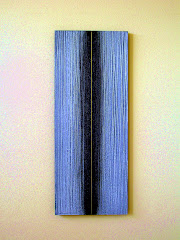I'm opening an exhibition of my work Friday, May 1. Just finished hanging it and it looks great! It's at Namaste Hospice Art and Events Center - they have a big First Friday celebration this coming Friday, lots of food, drink, and music. Check it out!
Hour and location are as follows:
Namaste Hospice Art and Events Center
3946 Tennyson, Denver
May 1 - June 27
Thursday & Friday 12pm-5pm
Saturday 11am-3pm
Opening Reception May 1, 6-10pm
Wednesday, April 29, 2009
Friday, April 17, 2009
Fear is a Vampire, Part II: The Cult of the Malevalent Universe
Tuning into NPR recently while driving I came upon an interview with one of the Cohn brothers, of movie making fame. He was talking of a book of poetry he had just published, and at the end of the interview William H. Macy read the title poem of the book, entitled "Drunk Drivers Have the Right of Way". It was a bleak, ugly little poem about how the brutes and power mad in life bulldoze down the rest of us and win out in the end....always, inevitably. It got me to thinking about vampires again.
What struck me about the poem was how it was less a poem then a declaration of belief, a lecture from the bully pulpit (the bully pulpit of cultural celebrity and wealth) about "reality", meant to dispel any illusions the reader might have about the truly ugly nature of life. It was...rather patronizing, in a patriarchal kind of way, like the Old Testament God with His plagues and pestilences. And like the Old Testament, it had a kind of fatalistic helplessness about it, but with a late 20th century nihilistic/existentialist/post-modern emptiness of spirit and heart.
I've only seen one of the Cohn brothers' films, "Fargo". In that film a group of brutal, brutish thugs following some blind impulse toward destruction and mayhem catalyze the darker impulses of ordinary white-bread citizens in North Dakota, leaving a long trail of blood and meaningless, stupid violence. There is a hero, the local sheriff, who prevails in the end but seems completely untouched by the events she witnesses, only sighing now and then at the tragedy of it all. It is a vision of contemporary life that presumes we are the living dead, our life-blood sucked dry, leaving us either as brutes stumbling about like the living dead in horror films, or soulless, emotionless automatons - drunk drivers and their victims. In this vision, life happens to us, and if we're lucky we get by; if not we get stomped like bugs.
I understand the cultural critique inherent in this, and I applaud the Cohn brothers for putting a mirror up to our eyes. And "Fargo" was pretty funny in a weird, deadpan kind of way, lifting some of the edge. However, after hearing the poet Cohn deliver his sermon-in-verse of hellfire and damnation it struck me that there is another agenda here. It seems many people like the poet Cohn are not content with suffering existential terror alone - they want to pull us into their black hole of despair and self-pity, as if by doing so they will somehow find a measure of redemption, or at least re-inflate their ego a little bit by proving their superior insight and sensitivity (no self-flagellation here, more like a BDSM dungeon with us as the unwilling guests).
Then it occurred to me - the poet Cohn was making a bid to become a cult leader! In general, cult leaders are narcissistic attention junkies who, like celebrities of all ilks (including art celebrities), need an audience to verify their existence to themselves. And of course, there is no shortage of people on the other end of the narcissist feed-back loop who need someone with charisma whom they can nibble upon with hungry adoration, desperate to fill their empty souls and impoverished bellys with the crumbs of personality dropped expertly from the celebrity/cult leader's plate of inflated ego. The poet Cohn's magnetism consists of his absolute certainty of the malevalence of the universe, a clever strategy since it invokes so much fear and terror in his audience, rendering them incapable of distinguishing wisdom from intellectual flabbiness, insight from blindered perception, heart and soul from mental mind games. And like many cult leaders he's a vampire, the Prince of Fear, proving once again that fear is a vampire.
What struck me about the poem was how it was less a poem then a declaration of belief, a lecture from the bully pulpit (the bully pulpit of cultural celebrity and wealth) about "reality", meant to dispel any illusions the reader might have about the truly ugly nature of life. It was...rather patronizing, in a patriarchal kind of way, like the Old Testament God with His plagues and pestilences. And like the Old Testament, it had a kind of fatalistic helplessness about it, but with a late 20th century nihilistic/existentialist/post-modern emptiness of spirit and heart.
I've only seen one of the Cohn brothers' films, "Fargo". In that film a group of brutal, brutish thugs following some blind impulse toward destruction and mayhem catalyze the darker impulses of ordinary white-bread citizens in North Dakota, leaving a long trail of blood and meaningless, stupid violence. There is a hero, the local sheriff, who prevails in the end but seems completely untouched by the events she witnesses, only sighing now and then at the tragedy of it all. It is a vision of contemporary life that presumes we are the living dead, our life-blood sucked dry, leaving us either as brutes stumbling about like the living dead in horror films, or soulless, emotionless automatons - drunk drivers and their victims. In this vision, life happens to us, and if we're lucky we get by; if not we get stomped like bugs.
I understand the cultural critique inherent in this, and I applaud the Cohn brothers for putting a mirror up to our eyes. And "Fargo" was pretty funny in a weird, deadpan kind of way, lifting some of the edge. However, after hearing the poet Cohn deliver his sermon-in-verse of hellfire and damnation it struck me that there is another agenda here. It seems many people like the poet Cohn are not content with suffering existential terror alone - they want to pull us into their black hole of despair and self-pity, as if by doing so they will somehow find a measure of redemption, or at least re-inflate their ego a little bit by proving their superior insight and sensitivity (no self-flagellation here, more like a BDSM dungeon with us as the unwilling guests).
Then it occurred to me - the poet Cohn was making a bid to become a cult leader! In general, cult leaders are narcissistic attention junkies who, like celebrities of all ilks (including art celebrities), need an audience to verify their existence to themselves. And of course, there is no shortage of people on the other end of the narcissist feed-back loop who need someone with charisma whom they can nibble upon with hungry adoration, desperate to fill their empty souls and impoverished bellys with the crumbs of personality dropped expertly from the celebrity/cult leader's plate of inflated ego. The poet Cohn's magnetism consists of his absolute certainty of the malevalence of the universe, a clever strategy since it invokes so much fear and terror in his audience, rendering them incapable of distinguishing wisdom from intellectual flabbiness, insight from blindered perception, heart and soul from mental mind games. And like many cult leaders he's a vampire, the Prince of Fear, proving once again that fear is a vampire.
Friday, April 3, 2009
Fear is a Vampire
I attended an informal talk with two art critics recently. The room was packed with energetic, forward-looking artists, eager to absorb useful information and insights from the arbiters of culture employed by our local newspapers. The moderator asked them to comment on their view of the local art scene, the trends and potentials. The first one to speak on the subject opened up the conversation with this line - "As we sit here on the cusp of the next Great Depression, completely paralyzed,....", and he went on from there in a low-key, almost bleak tone of voice; it felt like he was going to stop at any moment and take a deep sigh, maybe melt into a puddle of dark, black despair in front of our eyes. As you might imagine, the energy in the room immediately began a slow fizzle, the audience's shoulders drooping, eyes furrowing. I felt like shouting out "Speak for yourself!", but kept my mouth politely zippered (in retrospect, I wish I had spoken up).
In thinking about his comment on the way home it occurred to me that practically every meaningful discussion these days is prefaced by a reminder that the economy is bad, as if none of us is aware despite endless news reports and headlines warning of impending doom. I thought this might make a good Saturday Night live skit. Imagine a room full of people at a cocktail party sipping drinks and chatting, the conversation going something like this:
John: Well Glenda, since the economy is tanking, can I get you a drink?
Glenda: Yes John, I'd like a red wine in light of the highest unemployment rate in 25 years.
John: Being on the cusp of the next Great Depression, I bet you'd love a good Cabernet. I'm paralyzed myself, but before I go to the bar, let me introduce you to my good friend Hilda. (takes Glenda by the arm and steers her to a woman just entering the room) Hilda, so good to see you! Have you heard that 5.3 million jobs have been lost since September? Let me introduce you to my friend Glenda.
Hilda: Well John, given that we're in the middle of the worst recession in 30 years, I'd love to meet your friend!
Ok, SNL would do it better, but you get my gist. Musing on this brought my mind to a book I read a while back, "Toward a Psychology of Being" by Abraham Maslow. A psychologist born in 1908, Maslow came of age during the Great Depression and the slaughters of WWII, and his studies were steeped in the pessimism of Freud and the Existentialists. Curiously, his writings managed to turn Freud inside out, and his philosophy developed quite differently.
Maslow took a look at motivation, and made some interesting observations. He identified one type of motivation, the predominant one in our culture and age, as deficiency motivation. This is a motivation based on lack, on the desire to fill an empty hole, so to speak. Primary biological needs come under this category - hunger, thirst, shelter, etc. - but also a need for love, for attention because of lack of self-esteem, for prestige, for fame, for a new shiny car, for all of those things we don't have but want want want. In other words, neediness. Most people are driven primarily by these motivations. But he also took a focused look at a type of person he found intriguing, what he called the self-actualized person. These people have deficiency motivations, but their primary motivations are what he called growth motivations. These motivations are for creativity, exploration, learning, loving (versus wanting love), expansion, etc. He found this was a group who were more joyful, more giving, more ambitious, more curious, whatever the circumstance they found themselves in. He also found that these people were superior problem solvers, theorizing that those dominated by deficiency motivation saw various aspects of reality in light of whether or not it satisfied deficiencies, while the self-actualized had a more complete picture of reality, saw situations more clearly for what they were rather than for what they might be useful for, and therefore were able to make better choices and decisions. While Freud focused on the unhealthy - the neurotic and the psychotic - in order to learn how to cope, Maslow chose to focus on the healthy - the self-actualized - in order to learn how to live fully.
Motivation built on fear is a deficiency motivation. It clouds our thinking, confuses us, "paralyzes" us. I have a friend who spends most evenings on the Internet researching theories and opinions about the current world economic crisis. Every time I see him it's all he can talk about, and he's worked himself into a frenzy of paranoia and misery, an out of control feedback loop. He has chosen this, of course - deficiency motivation can cause us to make bad choices. He's a bit like the art critic I spoke of, not only afraid but insistent on making sure everyone else views reality from a vantage point of fear (misery loves company). They both drain energy from others, sucking it into a vortex of their own imaginings. They are cowards, afraid to live while simultaneously cringing at that fear of all fears, the fear of death.
Fear is a vampire - it sucks your lifeblood and turns you into a zombie, the living dead.
In thinking about his comment on the way home it occurred to me that practically every meaningful discussion these days is prefaced by a reminder that the economy is bad, as if none of us is aware despite endless news reports and headlines warning of impending doom. I thought this might make a good Saturday Night live skit. Imagine a room full of people at a cocktail party sipping drinks and chatting, the conversation going something like this:
John: Well Glenda, since the economy is tanking, can I get you a drink?
Glenda: Yes John, I'd like a red wine in light of the highest unemployment rate in 25 years.
John: Being on the cusp of the next Great Depression, I bet you'd love a good Cabernet. I'm paralyzed myself, but before I go to the bar, let me introduce you to my good friend Hilda. (takes Glenda by the arm and steers her to a woman just entering the room) Hilda, so good to see you! Have you heard that 5.3 million jobs have been lost since September? Let me introduce you to my friend Glenda.
Hilda: Well John, given that we're in the middle of the worst recession in 30 years, I'd love to meet your friend!
Ok, SNL would do it better, but you get my gist. Musing on this brought my mind to a book I read a while back, "Toward a Psychology of Being" by Abraham Maslow. A psychologist born in 1908, Maslow came of age during the Great Depression and the slaughters of WWII, and his studies were steeped in the pessimism of Freud and the Existentialists. Curiously, his writings managed to turn Freud inside out, and his philosophy developed quite differently.
Maslow took a look at motivation, and made some interesting observations. He identified one type of motivation, the predominant one in our culture and age, as deficiency motivation. This is a motivation based on lack, on the desire to fill an empty hole, so to speak. Primary biological needs come under this category - hunger, thirst, shelter, etc. - but also a need for love, for attention because of lack of self-esteem, for prestige, for fame, for a new shiny car, for all of those things we don't have but want want want. In other words, neediness. Most people are driven primarily by these motivations. But he also took a focused look at a type of person he found intriguing, what he called the self-actualized person. These people have deficiency motivations, but their primary motivations are what he called growth motivations. These motivations are for creativity, exploration, learning, loving (versus wanting love), expansion, etc. He found this was a group who were more joyful, more giving, more ambitious, more curious, whatever the circumstance they found themselves in. He also found that these people were superior problem solvers, theorizing that those dominated by deficiency motivation saw various aspects of reality in light of whether or not it satisfied deficiencies, while the self-actualized had a more complete picture of reality, saw situations more clearly for what they were rather than for what they might be useful for, and therefore were able to make better choices and decisions. While Freud focused on the unhealthy - the neurotic and the psychotic - in order to learn how to cope, Maslow chose to focus on the healthy - the self-actualized - in order to learn how to live fully.
Motivation built on fear is a deficiency motivation. It clouds our thinking, confuses us, "paralyzes" us. I have a friend who spends most evenings on the Internet researching theories and opinions about the current world economic crisis. Every time I see him it's all he can talk about, and he's worked himself into a frenzy of paranoia and misery, an out of control feedback loop. He has chosen this, of course - deficiency motivation can cause us to make bad choices. He's a bit like the art critic I spoke of, not only afraid but insistent on making sure everyone else views reality from a vantage point of fear (misery loves company). They both drain energy from others, sucking it into a vortex of their own imaginings. They are cowards, afraid to live while simultaneously cringing at that fear of all fears, the fear of death.
Fear is a vampire - it sucks your lifeblood and turns you into a zombie, the living dead.
Subscribe to:
Comments (Atom)





.jpg)